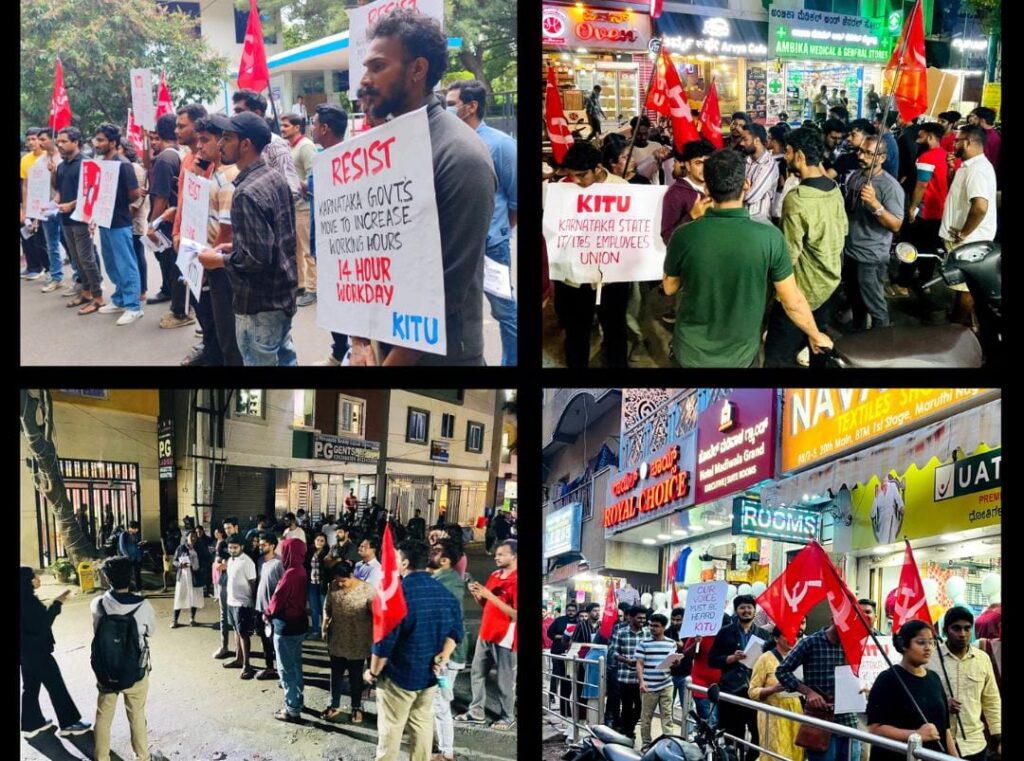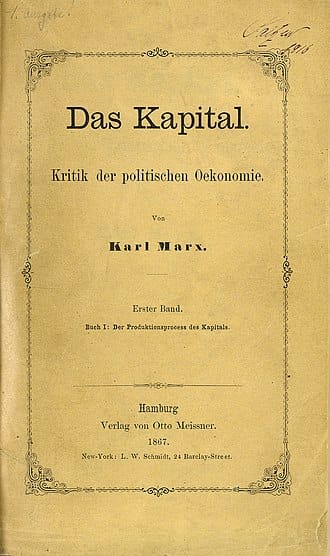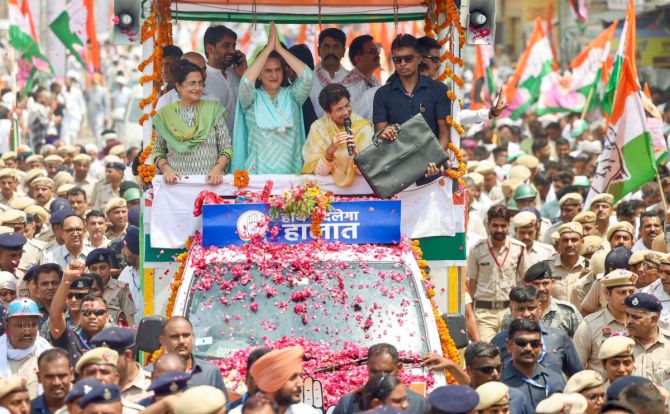
Many IT parks, residential areas, and bustling streets in Bengaluru have witnessed something unusual over the last few days. Youth holding placards and red flags protest the proposal to extend IT employees’ working hours. This kind of working-class action is unusual among Indian IT professionals. But, to their dismay, the authorities have discovered that the proposal to change the rules to allow for a 14-hour workday has met with stiff opposition. The media attention that these protests are receiving is also unprecedented.
According to news reports, the Karnataka government has received a proposal from companies to extend working hours to 14 hours. To incorporate this, it is considering amending the Karnataka Shops and Commercial Establishments Act, 1961. The current law allows a maximum of 10 hours of work per day, including overtime. The new proposal says that “employees in the IT/ITeS/BPO sector may be required or allowed to work more than 12 hours a day and not exceeding 125 hours in three continuous months.”

For the past two weeks, the Karnataka State IT/ITeS Employees Union (KITU) has been organizing various types of protests, including gate meetings in front of IT parks, street campaigns, and an email writing drive to Labour Minister Santosh Lad. The union’s representatives also met with the labour minister and senior officials from the Department of Labor and the IT-BT ministry to express their opposition to the move. They intend to hold a massive demonstration of IT/ITeS/BPO workers at Freedom Park on August 3.
The union’s opposition is primarily twofold. First, this amendment will allow businesses to transition to a two-shift system instead of the current three-shift system. This could lead to a massive reduction in employment. Second, the extended working hours are completely inhumane and pose significant risks to employees’ physical and mental health. According to an Onsurity and Knowledge Chamber of Commerce and Industry study, approximately 43% of Indian tech workers are concerned about their health at work. One of the main reasons for this is the long working hours. More than half of Indian technology professionals work an average of 52.5 hours per week, which is more than the national average of 47.7 hours. Normalizing the 14-hour workday only deteriorates this alarming situation, the labour union argues.

Interestingly, the National Association of Software and Services Companies (Nasscom) stated that it had not requested a 14-hour workday limit and was unaware of the Karnataka bill. According to Ashish Aggarwal, vice president and head of public policy at Nasscom, all they wanted was some flexibility within the country’s standard 48-hour work week. However, Labour Minister Santosh Lad insists that the industry is pressuring the government to extend working hours in the IT industry and that a decision will be made only after consultation with all stakeholders, including employees.

One thing is certain: there are efforts from some quarters to increase working hours in the IT/ITES sector in Karnataka. And, if implemented, it will have far-reaching consequences for India’s entire working class, not just the approximately 20 lakh workers employed in Karnataka’s 8,785 tech companies. Employers love long working days because time is money. Within current economic thinking, this is an easy case to make.
In this neoliberal era, the government’s obsession with the ease of doing business frequently results in the denial of workers’ right to decent working conditions. The IT industry in Karnataka has a long history of being exempt from even the most basic labour laws. The exemption from the Industrial Employment (Standing Orders) Act of 1946 that the industry currently enjoys is one example. This is a central labor law that requires employers to declare the terms and conditions of employment, such as hiring and firing procedures, work hours, attendance and leave policies, employment contract types, and rules governing both employer and employee misconduct. However, state governments can exempt certain industries at their discretion. Karnataka first exempted the IT-ITeS-BPO sector from this act in 2009, in response to industry lobby pressure, and this exemption has been extended three times since then. The latest was on June 10, 2024.

So the decision to amend the Karnataka Shops and Commercial Establishments Act to extend working hours in this sector should not be viewed as an isolated incident or a surprise move. Attempts to extend the workday have been ongoing for many years under various guises, ranging from lobbying to change applicable laws to achieving ideological consensus to make it a norm. Last year, Infosys founder N.R. Narayana Murthy suggested that Indian youth work 70 hours per week to boost the country’s competitiveness. Assuming a six-day work week, that is 11.4 hours a day! And he neglected to mention the deplorable working conditions under which the vast majority of India’s labor force is employed, including long hours of drudgery for pitiful wages.
Despite being described as a knowledge industry, labor time, like in other firms that employ a lot of manual labor, is a critical factor in an IT company’s profitability. At the end of the day, the profitability of an IT services company is directly proportional to the amount of time spent on a task. So over the years, IT companies have witnessed a gradual increase in work time without any significant increase in inflation-adjusted wage rates. It is worth noting that this is not very different from how mill owners in nineteenth-century England attempted to extend their laborers’ working hours. In Das Kapital, quoting reports of several such factory inspectors, Karl Marx wrote about “petty pilferings of minutes” from the labourer’s meal and recreation time and how “moments are the elements of profit.”

IT services companies in the twenty-first century, like those in the nineteenth century, recognize that moments are elements of profit. Pilfering minutes from employees’ time has been a key component of these companies’ profit-maximizing strategies for a long time. For example, a Times of India story on Nov 25, 2008 reported that “technology firms are increasing working hours and monitoring the hours worked far more rigorously than ever before in a bid to squeeze more out of employees in these difficult times.” According to that report, TCS increased the working hours by 1 hour to 9 hours and indicated that MNCs like Accenture have followed this practice. The report added that “by increasing work hours by an hour a day, an employee works an additional 22 hours a month. If an hour of his/her work is billed at $20, the company makes an additional billing of $440 per employee… Such work time extension works well for projects that are on what is called the ‘time & material’ model. Around 70% of tech projects are currently under this model, while the rest are fixed price projects where the service providers may resort to pruning the size of teams to bring costs down.”
According to a report published in the Hindustan Times on December 25, 2013, IT major Infosys’ decision to install software to track the actual time spent by employees on their computers caused widespread resentment. The report quoted an employee: “Earlier, they wanted to make us stay in the office for nine hours. Now, they want to measure how much time we spend on computers. These policies are completely out of sync with the times.”
Fast forward to 2024. The industry is now attempting to change the laws to allow 14-hour workdays. But there is a difference this time. While there had previously been no significant resistance from employees to attempts to extend work hours, this time there is a strong pushback. It is a positive development.

The eight-hour workday or 40-hour workweek became the norm in the civilized world following numerous struggles by workers and their unions. The struggle for a regular working day has been a major theme in class struggles since the rise of industrial capitalism a few centuries ago. As British thinker David Harvey wrote, “introductory courses in economics are unlikely ever to focus on the length of the working day as a serious issue. It was not discussed in classical political economy, either. Yet historically, there has been a monumental and ongoing struggle over the length of the working day, the working week. The working year (paid vacations), the working life (the retirement age), and the struggle are still with us. This is clearly a fundamental aspect of capitalist history and a central issue in the capitalist mode of production.”
The struggle continues…











